|
|
|
Sort Order |
|
|
|
Items / Page
|
|
|
|
|
|
|
| Srl | Item |
| 1 |
ID:
102655
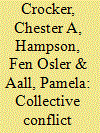

|
|
|
|
|
| Publication |
2011.
|
| Summary/Abstract |
This article surveys current security challenges and identifies obstacles to effective global and regional responses and cooperation in an era when security has become increasingly divisible. The new situation is partly explained by the complexity and variety of security challenges, both traditional and new, and by the linkages between them. It argues that a new pattern of improvised, ad hoc and often case-specific security mechanisms has developed, which it calls Collective Conflict Management (CCM). The argument is illustrated by reference to cases of CCM where a wide range of actors-multilateral institutions at the global and regional levels, individual states or ad hoc coalitions, professional and commercial bodies, and non-governmental organizations-collaborate in an effort to manage specific security threats and challenges, bringing together a variety of relationships, resources and skills. The urge for collective action, rather than unilateral or single actor-led, is motivated by a number of factors and 'drivers", not all of them necessarily positive or constructive. The article concludes that the success or failure of CCM will depend in part on the severity of the problems it faces and in part on the motives and incentives behind collective responses. This new pattern raises interesting and important questions for the future of international security. While CCM may be untidy and lack clear norms and standards, in many cases it may be the best available in an increasingly fractured world.
|
|
|
|
|
|
|
|
|
|
|
|
|
|
|
|
| 2 |
ID:
131100
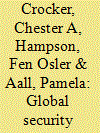

|
|
|
|
|
| Publication |
2014.
|
| Summary/Abstract |
At a time when the United Nations and key powerful states are pulling back from robust engagement in conflict management, regional organizations and ad hoc groupings of diverse organizations - collective conflict management initiatives - are stepping into the vacuum. In order to understand these two approaches - and why and when they may be operating together - this article compares them as they affect three significant questions and challenges in contemporary conflict management: is an intervention legitimate, is it effective, and does it set precedents for the community of states and international organizations that might be inclined to act. It notes that these approaches bring different strengths to an intervention process. Regional organizations play an increasingly critical role in providing legitimacy for an intervention, while the fact that collective conflict management initiatives do not set a precedent for further engagement allows them to act with more flexibility. The article concludes that neither of these approaches is sufficient to create a successor security regime to the post-cold war international system. It suggests that global power diffusion will be constrained by the irreplaceable core security competencies of powerful states acting bilaterally or, when it suits them, through regional bodies or the UN Security Council.
|
|
|
|
|
|
|
|
|
|
|
|
|
|
|
|
| 3 |
ID:
046882
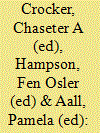

|
|
|
|
|
| Publication |
Washington, D C, United States Institute of Peace Press, 1999.
|
| Description |
xxi, 735p.
|
| Standard Number |
1878379933
|
|
|
|
|
|
|
|
|
|
|
|
Copies: C:1/I:0,R:0,Q:0
Circulation
| Accession# | Call# | Current Location | Status | Policy | Location |
| 045025 | 327.17/CRO 045025 | Main | On Shelf | General | |
|
|
|
|
| 4 |
ID:
078301


|
|
|
|
|
| Publication |
Washington, DC, United States Institute of Peace Press, 2007.
|
| Description |
xviii, 726p.
|
| Standard Number |
9781929223978
|
|
|
|
|
|
|
|
|
|
|
|
Copies: C:1/I:0,R:0,Q:0
Circulation
| Accession# | Call# | Current Location | Status | Policy | Location |
| 052452 | 327.172/CRO 052452 | Main | On Shelf | General | |
|
|
|
|
| 5 |
ID:
052262
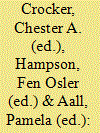

|
|
|
|
|
| Publication |
Washington, D.C., United States Institute of Peace Press, 1996.
|
| Description |
xxi, 641p
|
| Standard Number |
1878379593
|
|
|
|
|
|
|
|
|
|
|
|
Copies: C:1/I:0,R:0,Q:0
Circulation
| Accession# | Call# | Current Location | Status | Policy | Location |
| 046369 | 341.5/CRO 046369 | Main | On Shelf | General | |
|
|
|
|
| 6 |
ID:
098447
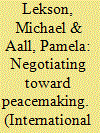

|
|
|
|
|
| Publication |
2010.
|
| Summary/Abstract |
This article outlines the approach of the United States Institute of Peace (USIP) to training in negotiation and associated skills. USIP has provided such training for over a decade to a wide array of international practitioners, both those who are in some way directly engaged in, or at least affected by, a conflict, and international third parties from outside the conflict zone. USIP concentrates in its negotiation training on building an understanding of the negotiating environment as well as on building specific negotiation strategies. In addition to skill-building, the training programs focus on developing an understanding of the nature and dynamics of conflict and of the overlapping and interlocking nature of actors, issues, and interests in a conflict situation. The article points out five elements of content that must be included to ensure a successful program, providing illustrative examples from actual workshops. These elements include helping participants to establish effective relationships with negotiating counterparts; presenting basic concepts; acquiring and improving skills; practicing through simulations; and working together on how best to apply these skills to the real world conflicts with which they are dealing. The two case studies describe training programs for Serbian and Albanian leaders in Kosovo, and for Iraqi civil servants.
|
|
|
|
|
|
|
|
|
|
|
|
|
|
|
|
| 7 |
ID:
176057


|
|
|
|
|
| Summary/Abstract |
A new ‘concert’ diplomacy is needed to foster informal, minilateral constellations of relevant actors operating alongside formal institutions of global governance.
|
|
|
|
|
|
|
|
|
|
|
|
|
|
|
|
| 8 |
ID:
007067


|
|
|
|
|
| Publication |
Spring 2000.
|
| Description |
121-141
|
|
|
|
|
|
|
|
|
|
|
|
|
|
|
|
| 9 |
ID:
141712


|
|
|
|
|
| Summary/Abstract |
Multiparty mediation, which occurs when two or more third parties cooperate or compete in helping antagonists negotiate a conflict settlement, carries both risks and rewards as a conflict management strategy. Cooperating multiple third parties can increase the chances of crafting an agreement, band together to create greater pressure on the conflict parties to reach agreement, and supply outside resources to help implement the negotiated agreement. Competing multiple third parties can undercut each other, prolonging the conflict and allowing antagonists to resist necessary compromises and negotiated concessions. This article examines the changing environment for multiparty mediation and the impact of five changes that affect the practice of mediation. It derives some interim conclusions about where the field is heading and offers some recommendations for making multiparty engagements more effective.
|
|
|
|
|
|
|
|
|
|
|
|
|
|
|
|
| 10 |
ID:
052265


|
|
|
|
|
| Publication |
Washington, D C, United States of Peace Press, 2001.
|
| Description |
xxxiv, 894p.
|
| Standard Number |
1929223277
|
|
|
|
|
|
|
|
|
|
|
|
Copies: C:1/I:0,R:0,Q:0
Circulation
| Accession# | Call# | Current Location | Status | Policy | Location |
| 045259 | 327.17/CRO 045259 | Main | On Shelf | General | |
|
|
|
|
|
|
|
|
|